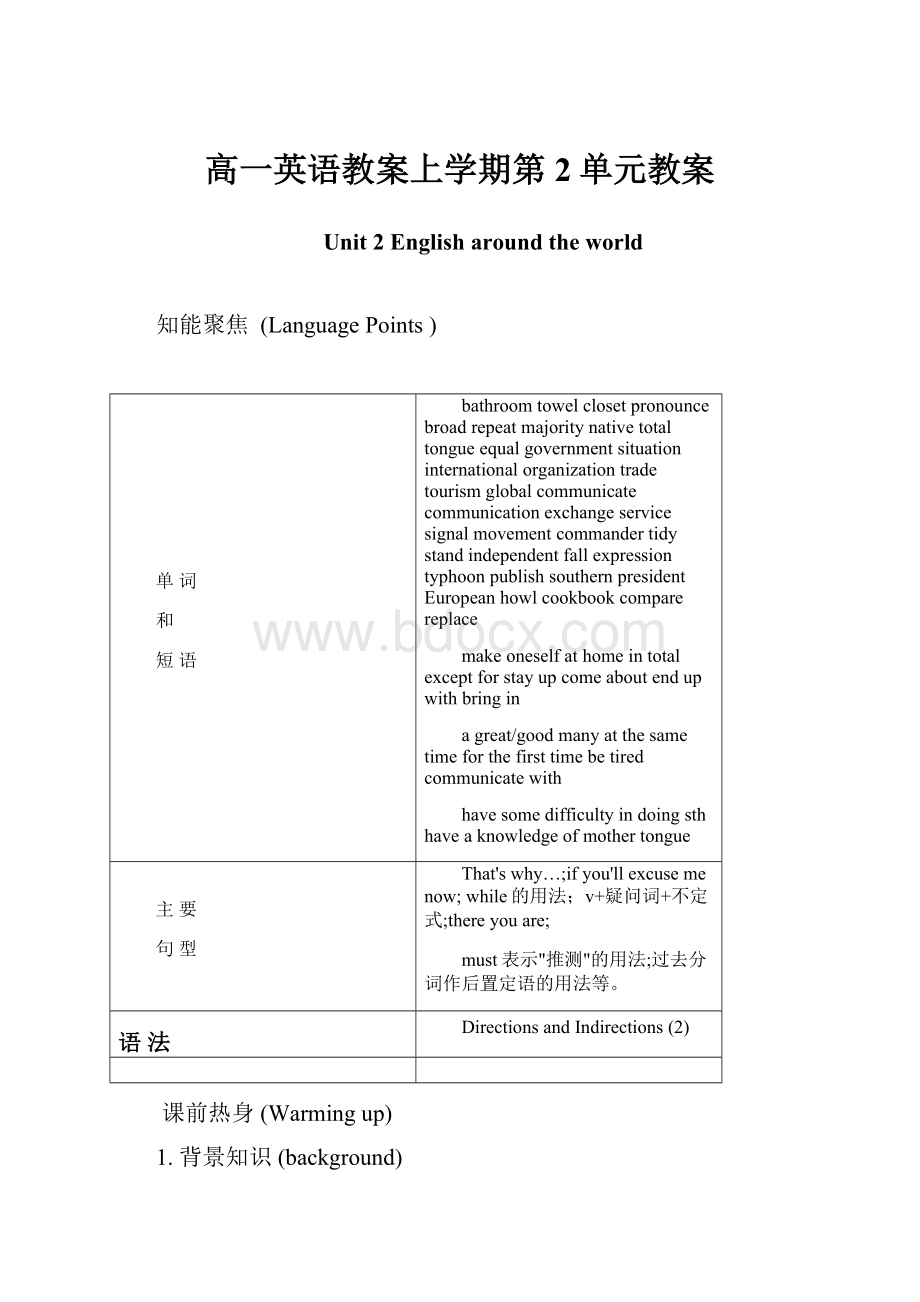高一英语教案上学期第2单元教案.docx
《高一英语教案上学期第2单元教案.docx》由会员分享,可在线阅读,更多相关《高一英语教案上学期第2单元教案.docx(22页珍藏版)》请在冰豆网上搜索。

高一英语教案上学期第2单元教案
Unit2Englisharoundtheworld
知能聚焦(LanguagePoints)
单词
和
短语
bathroomtowelclosetpronouncebroadrepeatmajoritynativetotaltongueequalgovernmentsituationinternationalorganizationtradetourismglobalcommunicatecommunicationexchangeservicesignalmovementcommandertidystandindependentfallexpressiontyphoonpublishsouthernpresidentEuropeanhowlcookbookcomparereplace
makeoneselfathomeintotalexceptforstayupcomeaboutendupwithbringin
agreat/goodmanyatthesametimeforthefirsttimebetiredcommunicatewith
havesomedifficultyindoingsthhaveaknowledgeofmothertongue
主要
句型
That'swhy…;ifyou'llexcusemenow;while的用法;v+疑问词+不定式;thereyouare;
must表示"推测"的用法;过去分词作后置定语的用法等。
语法
DirectionsandIndirections
(2)
课前热身(Warmingup)
1.背景知识(background)
英语小知识。
英语词汇之所以庞大而居世界之首,是因为它广开门户,善于吸收各种语言的词汇为己有,其中以吸收法语、拉丁语、希腊语为主。
英语本族语是指盎格鲁撒克逊民族流传下来的词汇,它的特点是词形短、词义多、构词能力强。
例如go在《新英汉词典》中不及物用法有21种;及物用法有4种;名词用法有10种;形容词用法有2种。
再如man可以构成下列airman,fireman,ploughman,workman,postman,chairman,Englishman,manhood,manly,manlike,manful,manhole,man-cating,manslaughter,manpower合成词、派生词等词。
英国学者C.K.Ogden和I.A.Richards于1920年曾提出BasicEnglish,其词汇量只有850多个。
他们的目的就是想减轻外国人学英语的负担,只用一些有限的词汇来表达思想和进行交际。
今天的美国英语就是17世纪英国殖民者当时带到美洲大陆上来的。
18世纪美国独立战争后,美国人民的民族情绪在语言问题上也表现出来了,出现了NoahWebster等人,积极倡导美国语言(Americanism)。
Webster身体力行,于1828年编辑出版了许多教科书和词典。
200多年来,美国英语产生了许多有别于英国英语的地方,其中最重要的变化当然是词汇了。
英国英语和美国英语在词汇方面的差异是:
第一、拼写不同。
Webster式美国英语拼写法要比英国拼法较为合理。
a.美式拼写更符合读音规则。
例如:
英美
theatretheater
labourlabor
b.美式拼写省去重写的字母。
例如:
英美
programmeprogram
cigarettecigaret
c.美式拼写省去不发音的字母。
例如:
英美
axeax
good-byegood-by
d.美式拼写改变了一些不规则动词。
例如:
英美
burntburned
smeltsmelled
e.其它不同形式。
例如:
英美
chequecheck
tyretire
第二、同词异义。
例如:
英美
vest内衫,汗衣西服背心
pants短裤裤子
第三、同义异词。
例如:
英美英美
铁路railwayrailroad卡车lorrytruck
行李luggagebaggage公寓flatapartment
电梯liftelevator糖果sweetscandy
电影filmmovie秋天autumnfall
有意思地是,词汇的不同有时侯连英美人自己也搞不清楚,甚至会产生笑话。
例如,爱尔兰的剧作家St.JohnGreenErvine第一次世界大战后到美国,当时他还没有注意到英美英语词汇的差异。
所以,有一次当他去一个美国家庭作客时,看到主妇非常朴实,使人不受拘束。
于是,他就赞美她说:
“Youareveryhomely.”结果,这话一出口,局面就很尴尬。
为什么?
因为homely在英国表示“诚朴”;在美国表示“丑陋,不漂亮”。
他本想恭维主人,结果成了侮辱她。
2.话题(topics)Whycan'thefindthebathroom?
WhatisitthatJoecan'tfindinthebathroom?
Whydoesn'tanAmericanunderstandanEnglishperson?
….
读写指导(InstructionsforReadingandWriting)
1.ReadingEnglishAroundTheWorld
Paragraph1.Englishisspokenasmothertongueandasasecondlanguage.
Paragraph2.ManypeoplelearnEnglishasaforeignlanguage.
Paragraph3.ManypeoplecommunicateinEnglisheveryday
2.Writing
c.HowtowriteKeysentences
b.WriteashortpassageaboutthedifferencesbetweenAmericanandBritishEnglish
c.conclusion.
【习文练习】假定你是一名来自农村的学生,在城镇学习了几年。
通过对比使你觉得农村和城镇的生活各有
利弊。
请按下列要点写一篇文章。
1.在城镇,样样事情都很便利,学校、商店都很近;交通比较便利。
2.同时,电影、戏剧等可供选择的范围很广。
3.在城镇,每时每刻都有令人感兴趣的事情,可供选择的活动场所很多。
4.但是,在农村,人口不多,空气新鲜,环境优美,寂静美好,农村人待人友好,乐于助人,生活费用较低,食品便宜。
注意:
1.根据以上要写一篇100词左右的说明文;
2.可参考的词语:
quiet,beautiful,clean,friendly,helpful,cheap,wide,convenient(便利的,方便的),
close,regular,easy等。
Onepossibleversion:
LifeBetweentheTownandtheCountry
Ihavelivedinthetownfornearlytwoyears,butbeforethatIlivedwithmyfamilyinavillageaboutahundredmilesawayfromhere.Lifeisverydifferentinthetwoplaces,buttherearethingsthatIlikeabouteachofthem.
Inthecountryitisquietandbeautifulsincetherearenotmanypeople.Theairisclean,andthereisbeautifulsceneryallaround.Thepeoplewholiveinthecountryseemfriendlyandhelpfultotheirneighbors.Thecostoflivingislowthere,becausefoodisusuallycheap.Ialsolikelivinginthetown.Inthetownthereareinterestingthingstodoallthetime.Peoplehaveabigchoiceofactivities.Thereisawideselectionofmovies,andmostofthetheatresaregood.Everythingisconvenienthere,sinceinthetownIcanliveclosetoalotofshopsandschools.Atthesametime,trafficisverygood,soitisnothardtogofromoneplacetoanother.
Iamveryhappyinthecountry,buttherearegoodchancesforworkandstudyinthetown,therefore,Iwillprobablystayhereforaperiodoftimeandworkhardatallmysubjects.
要点解析(KeyPointsAnalysis)
1.JoeisanAmericanwhohascometoBritainforthefirsttime.
此句中的forthefirsttime是介词短语,表示"首次,第一次",在句中作状语;类似的短语有forthesecondtime,第二次;forthelasttime,最后一次。
与forthefirsttime意思一样的短语还有thefirsttime,但thefirsttime为名词短语,常用来引导时间状语从句。
ThefirsttimeIcametoXianyang,itwasveryold.
我第一次来咸阳时,它非常破旧。
Whenwemeteachotherforthefirsttime,Ifeltveryashamedfromthecountryside.
当我们第一次见面时,我为自己来自乡下而羞愧不己。
2.betired,betiredof,betiredwith/from和betiredout
Youmustbeverytired.
此句中的betired表示"疲劳的,累的";
与此短语结构相类似的短语还有:
betiredof"对……感到厌烦,厌倦";
betiredwith/from"由于……而感到疲劳";
betiredout"累得筋疲力尽"。
Afterstudyingalltheweek.Iwasverytired.
经过一周的学习,我非常累。
Mybrotheristiredoutaftertheworkforthewholeday.
整天的工作使得我哥哥累得筋疲力尽。
Hewastiredwithridingthebicycleforalongtime.
我因长时间地骑自行车而疲惫不堪。
Atthebeginning,IwasinterestedinEnglish,whilenowIamtiredofit.
起初,我对英语非常感兴趣,然而,现在我对它却非常厌烦。
3.now(then),nowthat,nowandthen和nowandagain
Nowthen,didyouhaveagoodflight?
nowthen表示说话者的语气,有“说明,命令,请求,警告,安慰”的意思。
nowthat表示“既然,由于”。
nowandthen和nowandagain一样都表示“时而,不时”的意思。
Nowthenlistentome,Tom.汤姆,且听我讲。
(表示命令)
----Er,…er,…I……哦!
哦!
….我….
-----Nowthenwhatdoyoumean?
你到底是什么意思?
(表示不耐烦)
Nowthatyoucometothisschool,youshouldstudyhard.
既然你来这所学校,你应当刻苦学习。
Lastterm,Ioftenwenttothecinemanowandthen.
上学期,我经常去看电影。
4.…justmakeyourselfathome.
此句中的makeyourselfathome表示“请随便一点,别客气,不要拘谨”,是招待客人时的客套用语。
类似的还有helpyourself(to)。
---CouldIuseyourcup?
我可以用一下你杯子吗?
---Makeyourselfathome.别客气!
5.Harry,bringthesetwopizzastoMr.ThompsononBroadStreet,number12.
这里的bring和take,fetch,get,carry等一样都含有“带,拿”等意思。
bring“拿来,带来”,强调从别处带来某人某物;
take“拿走,带走”,强调带着某物或某人离开说话人所在的地方;
fetch表示goandget,“去取”,含有“往返”之意;
get常用在口语中;
carry不同于其它四个词,它表示“携带,搬运”,强调物体随身移动。
6..Don'tforgettobuymesomeketchuponyourwayback.
forgettodosth短语,即“忘记去做某事”;
forgetdoingsth表示“忘记已经做过某事”。
Don'tforgettobringmethebookyouhaveborrowedfrommetomorrow.
明天别忘记带上你曾经借我的那本书。
---Whydoyougototheclassroomagain?
你为什么还要再去教室?
---Oh!
Iforgothavingfinishedmyhomework.哦!
我忘了已经做完作业了。
类似的短语还有:
a.remembertodosomething“记着要去做某事”
b.rememberdoingsomething“记着已经做了某事”
c.regrettodosomething“对将要做的事情感到遗憾”
d.regretdoingsomething“对已做过的事情感到遗憾”
7.Intotal,formorethan375millionpeopleEnglishis….
intotal表示“总共,合计”;
inall,表示“总计,全部”。
Intotal,Ispent1200yuanonthecostofschoolingthisterm.
这学期,我总共花了1200元的学费。
Thereare35boysinourclassinall.我们总共有三十五名男生。
8.mothertongue,motherlanguage,nativelanguage和asecondlanguage
mothertongue=motherlanguage=nativelanguage,都表示“母语,本族语”;
asecondlanguage表示“第二语言”。
Chineseisourmothertongue/nativelanguage/motherlanguage.
汉语是我们的母语。
EachofusinourclassshouldlearnEnglishasasecondlanguage.
在我们班上,每个人都应当把英语当作第二语言来学习。
9.AnequalnumberofpeoplelearnEnglishasasecondlanguage.
However,thenumberofpeoplewholearnEnglishasaforeignlanguageismorethan750million.
从以上两句不难看出,anumberof表示“许多”,修饰复数名词,number前可加large,great,good等词,即:
agood/great/largenumberof;含有anumberof的句子谓语动词用复数。
thenumberof表示“……的数目”,强调数字;含有thenumberof的句子谓语动词用单数。
ThenumberofstudentsinPujiSeniorMiddleSchoolisnearly4000.
普集高中有近四千学生。
Atpresent,alargenumberofstudentsdarespeakEnglishinclass.
目前,许多学生敢在课堂上讲英语。
10.exceptfor,except,exceptthat,exceptwhen,except+不定式和besides
InChinastudentslearnEnglishatschoolasaforeignlanguage,exceptforthoseinHongKong.
exceptfor“只是,只有(在说明基本情况后,对某些细节问题加以纠正,强调不足);
except“除……之外”,并不包括except之后的内容,这是该词与but意思相同。
它常与不定代词everything,everybody,nothing,everyone,all或副词everywhere,always,usually,every+noun连用;
exceptthat从句表示“除知道……,其他一无所知”;
exceptwhen从句表示“除了……(该从句表时间)”;
except+不定式表示“除了干某事,未做别的事”,此结构常与nothing连用;
besides则是“除……之外”,包括之后的内容,含有“除……之外(还有)”之意,常与代词anyoneelse,theother,others,another或副词also,too连用。
Thispieceofclothesisverygoodexceptforitslightcolor.
这件衣服不错,只是颜色有点浅。
Exceptforyourbadhandwriting,yourcompositionisverygood.
除了你的书写糟糕外,你的作文还不错。
HeisgoodateverysubjectexceptEnglish.
除了英语,其它各门功课他都擅长。
HeisgoodatothersubjectsbesidesEnglish.
除了英语,他还擅长其它课程。
SheknowsnothingaboutmeexceptthatIteachEnglishatschool.
她只知道我在学校教英语,其它她一无所知。
Ilearnednothingexcepttoknowthetopicinthisclass.
这节课我除了知道标题外,其它一无所学。
Ioftenstayathomeexceptwhenitisfine.除了晴天,我经常呆在家中。
11.…Englishhasdevelopedintothelanguagemostwidelyspokenandusedintheworld.
widely,adv,表示“广泛地”等抽象意义;
wideadj/adv,表示“宽的/地,大的/地”等具体意义。
注意wide与widely在句中与动词的位置。
Iopenedmymouthwideatthesadnewsinsurprise.
听到这悲伤的消息,我吃惊地张大嘴巴。
Atpresent,bothEnglishandcomputershavebeenwidelyspokenandused.
12.comeabout,happen,takeplace和breakout
Howdidthesedifferencescomeabout?
此句中的comeabout同happen,takeplace,breakout一样都表示“发生”,都属于不及物动词,但它们的用法不同。
comeabout“发生,产生”,着重指解释或说明事情发生的理由,且经常与how连用;
happen“发生”,属普通词汇,指偶然的,意外的,指自发的未能预见的事情发生;
takeplace“发生”,指事件或事故的发生是在预料中的并非偶然发生的;
breakout“发生,爆发”,着重指战争,火灾,疾病的突然发生。
Howdoesthedifferencecomeaboutbetween“comeabout”and“happen”?
“comeabout”和“happen”之间的差异是怎样产生的?
Attheendof2003,Birdflu